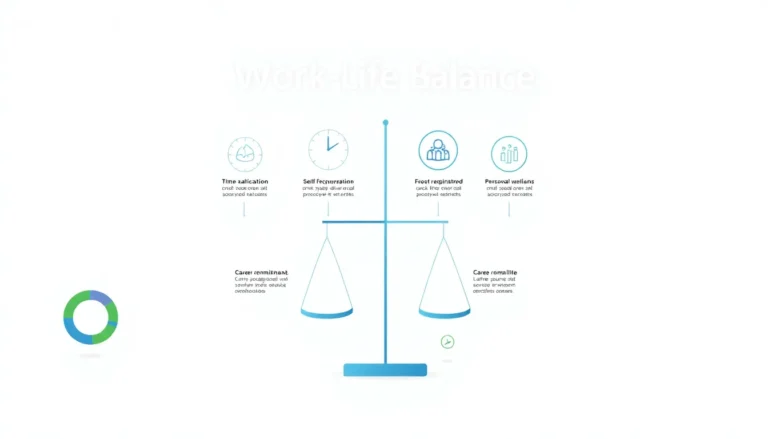Table of Contents
ToggleIn a world where stress levels soar higher than a cat in a tree, improving life quality isn’t just a luxury—it’s a necessity. Everyone’s on the quest for that elusive balance between work, play, and a little bit of sanity. What if they could unlock the secret to living their best life without sacrificing their Netflix binge-watching sessions?
Understanding Life Quality Improvement
Improving life quality encompasses various aspects of well-being. Recognizing its significance leads to a more fulfilling existence amidst modern challenges.
Definition and Importance
Life quality improvement refers to enhancing overall well-being and happiness. It involves physical health, mental stability, emotional resilience, and social connectivity. Prioritizing these areas becomes essential as individuals navigate pressures from work and daily responsibilities. Achieving balance contributes to better life satisfaction. The importance of this improvement lies in its impact on everyday experiences. Increased life quality can lead to reduced stress levels and increased productivity. Individuals often discover that small changes yield significant benefits, making life more enjoyable and meaningful.
Key Indicators of Life Quality
Several indicators signal the state of life quality. Physical health plays a critical role, with factors such as exercise frequency and diet quality influencing well-being. Mental health is equally important, as diverse strategies like mindfulness practices can enhance emotional balance. Social relationships contribute significantly; strong connections often lead to greater happiness. Financial wellbeing shouldn’t be overlooked, serving as a foundation for security and peace of mind. Ultimately, each indicator interconnects, highlighting that improving life quality requires a comprehensive approach.
Strategies for Life Quality Improvement

Improving life quality involves targeted strategies across various aspects of well-being. Each area contributes significantly to overall satisfaction.
Physical Health Enhancements
Engaging in regular physical activity boosts energy levels and enhances mood. Incorporating activities like walking, jogging, or yoga into daily routines can improve both fitness and outlook. Eating balanced meals supports physical health, while hydration maintains optimal body function. Prioritizing sufficient sleep aids recovery and cognitive function, leading to better performance in daily tasks. Regular check-ups allow for early detection of health issues, ensuring proactive management.
Mental Well-Being Practices
Practicing mindfulness reduces stress and increases emotional resilience. Techniques such as meditation or deep-breathing exercises foster a sense of calm. Journaling thoughts and feelings promotes self-reflection, allowing for better emotional processing. Maintaining a balance between work and personal life contributes to mental stability. Seeking professional help, when needed, facilitates coping with challenges effectively. Overall, nurturing mental well-being enhances life quality.
Social Connections and Community Engagement
Building strong social connections improves emotional support and overall happiness. Engaging in community activities fosters a sense of belonging and purpose. Joining clubs or volunteering provides opportunities for meaningful interactions. Prioritizing relationships with family and friends strengthens social networks. Regular communication with loved ones enhances emotional health and provides support during difficult times. Active involvement in one’s community contributes to a fulfilling life experience.
Role of Technology in Life Quality Improvement
Technology plays a crucial part in enhancing life quality. It provides innovative tools and platforms that target mental, physical, and emotional well-being.
Health Apps and Monitoring Tools
Health apps and monitoring tools significantly improve individual health management. They enable users to track fitness progress, monitor vital signs, and adhere to dietary plans. Many applications offer personalized insights, assisting users in setting and reaching specific health goals. Research indicates that consistent use of these apps leads to better health outcomes. Features like reminders for medication, hydration, and exercise create accountability. Moreover, wearable devices such as fitness trackers provide real-time health data, allowing users to make informed decisions. Technological advancements in health monitoring contribute directly to enhanced overall well-being.
Online Support Communities
Online support communities offer valuable resources for emotional resilience and social connectivity. These platforms bring together individuals facing similar challenges, creating a sense of belonging. Members share experiences, advice, and encouragement, which fosters personal growth. Resources like forums and social media groups help individuals navigate mental health issues, offering peer support. Research shows that participation in online communities reduces feelings of isolation and improves mental health outcomes. Accessing these digital spaces enhances connections and promotes shared understanding, leading to richer social interactions. Engaging in online support networks strengthens overall life satisfaction and provides essential tools for coping with life’s challenges.
Case Studies of Successful Life Quality Improvement
Numerous case studies illustrate effective strategies for enhancing life quality. Each example sheds light on practical applications that promote well-being.
Individual Success Stories
Many individuals have transformed their lives through targeted improvements. A young professional increased productivity by incorporating regular physical activity into her routine. She reported higher energy levels and reduced stress. Another individual found emotional stability through mindfulness practices, leading to better decision-making at work. Participants in fitness challenges documented weight loss and improved self-esteem. Their success highlights the impact of focused strategies tailored to personal needs.
Community-Based Initiatives
Communities have successfully implemented programs promoting overall well-being. A city launched a community garden initiative that encourages social interaction and nutrition education. This project fostered social connections while improving residents’ diets. Another program focused on mental health, providing accessible workshops on resilience and coping strategies. Participants noted enhanced emotional strength and reduced feelings of isolation. Collaborative efforts like these demonstrate that collective action can significantly enhance life quality for many.
Improving life quality is essential for navigating the complexities of modern existence. By focusing on physical health mental stability emotional resilience and social connections individuals can create a more fulfilling life experience. Small changes in daily routines can yield significant benefits leading to reduced stress and increased productivity.
Embracing technology and community support can further enhance this journey. With the right tools and strategies anyone can take actionable steps toward a happier more balanced life. Prioritizing well-being isn’t just beneficial; it’s a vital aspect of living a meaningful and enjoyable life.







